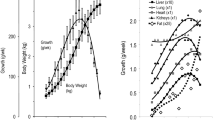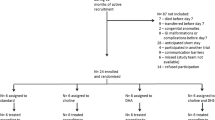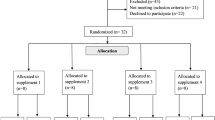Abstract
Background
Choline forms the head group of phosphatidylcholines, comprising 40–50 % of cellular membranes and 70–95 % of phospholipids in surfactant, bile, and lipoproteins. Moreover, choline serves as the precursor of acetylcholine and is important for brain differentiation and function. While accepted as essential for fetal and neonatal development, its role in preterm infant nutrition has not yet gained much attention.
Methods
The adequate intake of choline of preterm infants was estimated from international recommendations for infants, children, and adults. Choline intake relative to other nutrients was determined retrospectively in all inborn infants below 1,000 g (extremely low birth weight) or below 28 weeks gestational age, admitted to our department in 2006 and 2007 (N = 93).
Results
Estimation of adequate intake showed that children with 290 g body weight need more choline than those with 1,200 g (31.4 and 25.2 mg/kg/day, respectively). Day-by-day variability was high for all nutrient intakes including choline. In contrast to the continuous intrauterine choline delivery, median supply reached a plateau at d11 (21.7 mg/kg/day; 25th/75th percentile: 19.6; 23.9). Individual choline supply at d0–d1 and d2–d3 was <10 mg/kg/day in 100 and 69 % of infants, respectively. Furthermore, intakes <10 mg/kg/day were frequently observed beyond day 11. Median adequate intakes (27.4 mg/kg/day at 735 g body weight) were achieved in <2 %.
Conclusions
Nutritional intake of choline in this cohort of preterm infants was frequently less than the estimated adequate intake, with particular shortage until postnatal d10. Because choline is important for brain development, future studies are needed to investigate the effects of adequate nutritional choline intake on long-term neurodevelopment in VLBW infants.






Similar content being viewed by others
References
Schmitz G, Müller G (1991) Structure and function of lamellar bodies, lipid-protein complexes involved in storage and secretion of cellular lipids. J Lipid Res 32:1539–1570
Cohen DE (1996) Hepatocellular transport and secretion of biliary phospholipids. Semin Liver Dis 16:191–200
Mason TM (1998) The role of factors that regulate the synthesis and secretion of very-low-density lipoprotein by hepatocytes. Crit Rev Clin Lab Sci 35:461–487
Li Z, Vance DE (2008) Phosphatidylcholine and choline homeostasis. J Lipid Res 49:1187–1194
Mason JB (2003) Biomarkers of nutrient exposure and status in one-carbon (methyl) metabolism. J Nutr 133:941S–947S
Zeisel SH (2000) Choline: needed for normal development of memory. J Am Coll Nutr 19:528s–531s
Resseguie ME, da Costa KA, Galanko JA, Patel M, Davis IJ, Zeisel SH (2011) Aberrant estrogen regulation of PEMT results in choline deficiency-associated liver dysfunction. J Biol Chem 286:1649–1658
Walker JB (1979) Creatine: biosynthesis, regulation, and function. Adv Enzymol Relat Areas Mol Biol 50:177–242
Weisberg IS, Jacques PF, Selhub J, Bostom AG, Chen Z, Curtis Ellison R, Eckfeldt JH, Rozen R (2001) The 1298A>C polymorphism in methylene tetrahydrofolate reductase (MTHFR): in vitro expression and association with homocysteine. Atherosclerosis 156:409–415
Zeisel SH, Blusztajn JK (1994) Choline and human nutrition. Annu Rev Nutr 14:269–296
Zeisel SH (2006) Choline: critical role during fetal development and dietary requirements in adults. Annu Rev Nutr 26:229–250
Leventer SM, Rowell PP (1984) Investigation of the rate-limiting step in the synthesis of acetylcholine by the human placenta. Placenta 5:261–270
Molloy AM, Mills JL, Cox C, Daly SF, Conley M, Brody LC, Kirke PN, Scott JM, Ueland PM (2005) Choline and homocysteine interrelations in umbilical cord and maternal plasma at delivery. Am J Clin Nutr 82:836–842
Ozarda Ilcol Y, Uncu G, Ulus IH (2002) Free and phospholipid-bound choline concentrations in serum during pregnancy, after delivery and in newborns. Arch Physiol Biochem 110:393–399
Zeisel SH, Mar MH, Zhou Z, da Costa KA (1995) Pregnancy and lactation are associated with diminished concentrations of choline and its metabolites in rat liver. J Nutr 125:3049–3054
Food and Nutrition Board, Institute of Medicine, National Academy of Sciences (1998) Dietary reference intakes: thiamin, riboflavin, niacin, vitamin B-6, vitamin B012, pantothenic acid, biotin, and choline, vol 1. National Academy Press, Washington, DC, pp 390–422
Wikland KA, Luo ZC, Niklasson A, Karlberg J (2002) Swedish population-based longitudinal reference values from birth to 18 years of age for height, weight and head circumference. Acta Paediatr 91:739–754
Caudill MA (2010) Pre- and postnatal health: evidence of increased choline needs. J Am Diet Assoc 110:1198–1206
Subcommittee on Interpretation and Uses of Dietary Reference Intakes and the Standing Committee on the Scientific Evaluation of Dietary Reference Intakes, Food and Nutrition Board, Institute of Medicine (2000) Appendix F: rationale for setting adequate intakes. In: DRI—dietary reference intakes, applications in dietary assessment. A report of the subcommittee on interpretation and uses of dietary reference intakes and the standing committee on the scientific evaluation of dietary reference intakes. National Academy Press, Washington, DC, pp 239–253
Voigt M, Rochow N, Straube S, Briese V, Olbertz D, Jorch G (2010) Birth weight percentile charts based on daily measurements for very preterm male and female infants at the age of 154–223 days. J Perinat Med 38:289–295
Holmes-McNary MQ, Cheng WL, Mar MH, Fussell S, Zeisel SH (1996) Choline and choline esters in human and rat milk and in infant formulas. Am J Clin Nutr 64:572–576
Udipi SA, Kirksey A, West K, Giacoia G (1985) Vitamin B6, vitamin C and folacin levels in milk from mothers of term and preterm infants during the neonatal period. Am J Clin Nutr 42:522–530
Bernhard W, Pynn CJ, Jaworski A, Rau GA, Hohlfeld JM, Freihorst J, Poets CF, Stoll D, Postle AD (2004) Mass spectrometric analysis of surfactant metabolism in human volunteers using deuterated choline. Am J Respir Crit Care Med 170:54–58
Ilcol YO, Ozbek R, Hamurtekin E, Ulus IH (2005) Choline status in newborns, infants, children, breast-feeding women, breast-fed infants and human breast milk. J Nutr Biochem 16:489–499
Bligh J (1952) The level of free choline in plasma. J Physiol 117:234–240
Hjelle JT, Steidley KR, Pavlina TM, Dobbie JW (1993) Choline incorporation into phospholipids in mesothelial cells in vitro. Perit Dial Int 13:289–295
Lockman PR, Allen DD (2002) The transport of choline. Drug Dev Ind Pharm 28:749–771
Wecker L (1990) Dietary choline: a limiting factor for the synthesis of acetylcholine by the brain. Adv Neurol 51:139–145
Cansev M, Wurtman RJ, Sakamoto T, Ulus IH (2008) Oral administration of circulating precursors for membrane phosphatides can promote the synthesis of new brain synapses. Alzheimers Dement 4(1 Suppl 1):S153–S168
Stocker JT, Dehner LP, Husain AN (2005) Means and standard deviations of weights and measurements of lifeborn infants by body weight. In: Stocker JT, Dehner LP (eds) Pediatric pathology, 2nd edn. Lippincott Williams and Wilkins, Philadelphia, pp 1302–1304
Koc H, Mar MH, Ranasinghe A et al (2002) Quantitation of choline and its metabolites in tissues and foods by liquid chromatography/electrospray ionization-isotope dilution mass spectrometry. Anal Chem 74:4734–4740
Pynn CJ, Henderson NG, Clark H, Koster G, Bernhard W, Postle AD (2011) Specificity and rate of human and mouse liver and plasma phosphatidylcholine synthesis analyzed in vivo. J Lipid Res 52:399–407
Fischer LM, daCosta KA, Kwock L, Stewart PW, Lu TS, Stabler SP, Allen RH, Zeisel SH (2007) Sex and menopausal status influence human dietary requirements for the nutrient choline. Am J Clin Nutr 85:1275–1285
Subcommittee on Interpretation and Uses of Dietary Reference Intakes and the Standing Committee on the Scientific Evaluation of Dietary Reference Intakes, Food and Nutrition Board, Institute of Medicine (2000) Applications in dietary assessment. In: DRI—dietary reference intakes, applications in dietary assessment. A report of the subcommittee on interpretation and uses of dietary reference intakes and the standing committee on the scientific evaluation of dietary reference intakes. National Academy Press, Washington, DC, pp 106–112
Widdowson EM, Spray CM (1951) Chemical Development in utero. Arch Dis Child 26:205–214
Hartnoll G, Bétrémieux P, Modi N (2000) Body water content of extremely preterm infants at birth. Arch Dis Child Fetal Neonatal Ed 83:F56–F59
Zeisel SH, Da Costa KA, Franklin PD, Alexander EA, Lamont JT, Sheard NF, Beiser A (1991) Choline, an essential nutrient for humans. FASEB J 5:2093–2098
Zeisel SH (1981) Dietary choline: biochemistry, physiology, and pharmacology. Annu Rev Nutr 1:95–121
Leitch CA, Denne SC (2005) Energy. In: Tsang RC, Uauy R, Koletzko B, Zlotkin S (eds) Nutrition of the preterm infant. Digital Educational, Cincinnati, pp 23–44
Buchman AL (2009) The addition of choline to parenteral nutrition. Gastroenterology 137:S119–S128
Finkelstein JD (2007) Metabolic regulatory properties of S-adenosylmethionine and S-adenosylhomocysteine. Clin Chem Lab Med 45:1694–1699
Brosnan JT, Brosnan ME (2006) The sulfur-containing amino acids: an overview. J Nutr 136:S1636–S1640
Agostoni C, Buonocore G, Carnielli VP, De Curtis M, Darmaun D, Decsi T, Domellöf M, Embleton ND, Fusch C, Genzel-Boroviczeny O, Goulet O, Kalhan SC, Kolacek S, Koletzko B, Lapillonne A, Mihatsch W, Moreno L, Neu J, Poindexter B, Puntis J, Putet G, Rigo J, Riskin A, Salle B, Sauer P, Shamir R, Szajewska H, Thureen P, Turck D, van Goudoever JB, Ziegler EE, ESPGHAN Committee on Nutrition (2010) Enteral nutrient supply for preterm infants: commentary from the European Society for Paediatric Gastroenterology, Hepatology, and Nutrition. J Pediatr Gastroenterol Nutr 50:85–91
Sha W, da Costa KA, Fischer LM, Milburn MV, Lawton KA, Berger A, Jia W, Zeisel SH (2010) Metabolomic profiling can predict which humans will develop liver dysfunction when deprived of dietary choline. FASEB J 24:2962–2975
Weisberg IS, Park E, Ballman KV, Berger P, Nunn M, Suh DS, Breksa AP III, Garrow TA, Rozen R (2003) Investigations of a common genetic variant in betaine-homocysteine methyltransferase (BHMT) in coronary artery disease. Atherosclerosis 167:205–214
Chen DF, Hu YH, Yang F, Wu BY, Chen L, Fang ZA, Wang LH (2004) Mothe’s and child’s methylenetetrahydrofolate reductase C677T polymorphism is associated with preterm delivery and low birth weight. Beijing Da Xue Xue Bao 18(36):248–253
Gwee MC, Sim MK (1978) Free choline concentration and cephalin-N-methyltransferase activity in the maternal and foetal liver and placenta of pregnant rats. Clin Exp Pharmacol Physiol 5:649–653
Fischer LM, da Costa KA, Kwock L, Galanko J, Zeisel SH (2010) Dietary choline requirements of women: effects of estrogen and genetic variation. Am J Clin Nutr 92:1113–1119
Acknowledgments
This work was supported by an institutional grant (project no. E.1100008) of the ZEM—Zentrum Ernährungsmedizin of the Medical Faculty of the University of Tuebingen and the University of Hohenheim.
Author information
Authors and Affiliations
Corresponding author
Rights and permissions
About this article
Cite this article
Bernhard, W., Full, A., Arand, J. et al. Choline supply of preterm infants: assessment of dietary intake and pathophysiological considerations. Eur J Nutr 52, 1269–1278 (2013). https://doi.org/10.1007/s00394-012-0438-x
Received:
Accepted:
Published:
Issue Date:
DOI: https://doi.org/10.1007/s00394-012-0438-x




